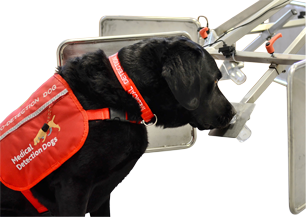Dogs Can Detect Prostate Cancer 4 Times Better Than Traditional Tests, With Low False-Positive Rate

Dogs are renowned for their keen sense of smell, and researchers have tested their abilities and have found they are almost four times better at detecting prostate cancer than traditional tests. These specially trained animals, known as Medical Detection Dogs are trained in Buckinghamshire, UK, and have the ability to accurately detect the cancer 90 percent of the time.
“MDD’s trained dogs can detect cancer before noticeable symptoms and others have been trained to recognize dangerously low sugar levels in diabetics. In short, this wonderful charity is training dogs to save lives,” said Betsy Duncan Smith, a trustee of the Medical Detection Dogs charity.
In 2010, almost 196,038 men were diagnosed with prostate cancer in the United States, according to Centers for Disease Control and Prevention. That same year, 28,560 men died from prostate cancer, a disease in which recovery relies very heavily on early detection and treatment.
“Dogs can pick up a scent in a dilution of one to a thousand parts. Their superior smelling power is well known. So why the reluctance to embrace this tested, time-old technology?” Smith said.
These dogs are able to detect cancer cells in urine samples. Dr. Claire Guest, chief executive and director of operations at Medical Detection Dogs said, “These results from the detection dogs are remarkable. “
The charity foundation believes millions of dollars have been wasted on traditional testing methods since there has been little improvement in their reliability. They believe resources have been wasted and instead should be focused on the use of these trained dogs.
“Moreover, the detection dogs provide alternative solution that yields consistently accurate results. If our detection dogs were a machine, there would be huge demand for them,” Guest said.
Recently, a machine has been created. It’s called the “electronic nose,” and it is capable of detecting prostate cancer from a urine sample with nearly 80 percent accuracy, according to a proof-of-concept pilot study published in the Journal of Urology.
"This is a technology that has been under development for some time, and it is encouraging to see this now applied to the early detection of prostate cancer," Dr. Nicholas J. Vogelzang, a specialist in genitourinary oncology at the Comprehensive Cancer Centers of Nevada in Las Vegas, told Medscape Medical News.
The device, ChemPro 100 eNose, is still in relatively early developmental stages, but experts believe it has potential to become a standardized diagnostic method, and to outshine current methods such as screening for prostate-specific antigen (PSA). Seventy-five percent of traditional PSA tests result in false positives.
“MDD’s trained dogs can detect cancer before noticeable symptoms and others have been trained to recognize dangerously low sugar levels in diabetics,” Smith said. In short, this wonderful charity is training dogs to save lives.”
The dogs start out as puppies in safe homes for the first 18 months of their lives. The charity provides food, equipment, and all veterinary costs while the puppy is in the family’s care. The dogs are trained to assist individuals who have complex health conditions, including those with low blood sugar and diabetes.
"Iain and I are trying to help the charity,” Smith said of she and her husband. “We’ve recently fostered one of the cancer detection dogs. We are both enjoying having Jobi, a delightful little black spaniel, around the house!”
Published by Medicaldaily.com



























